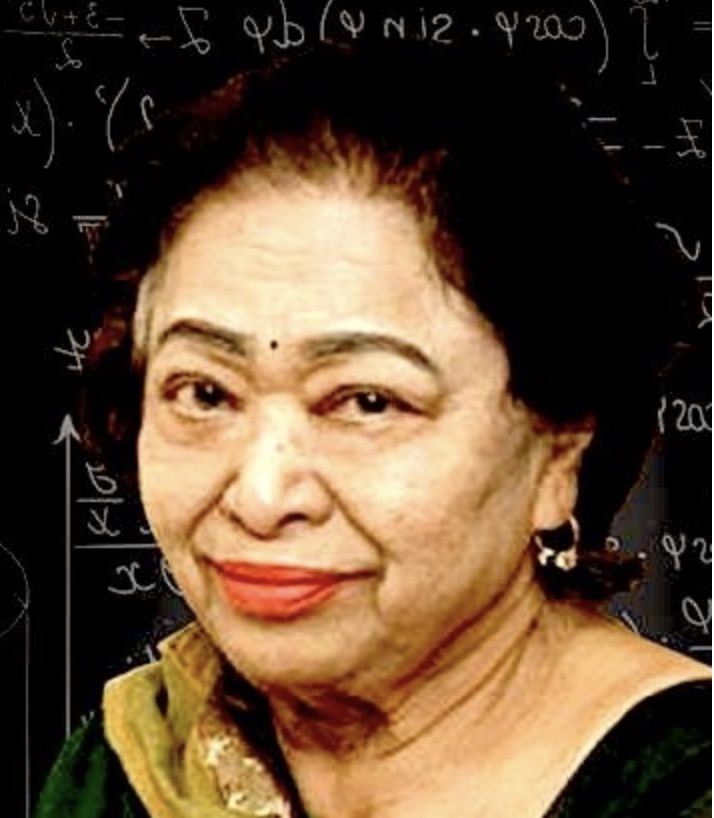
Shakuntala Devi, also known as the “Human Computer,” was born on November 4, 1929 into a Kannada Brahmin family, in Bangalore, India. Her father, C V Sundararaja Rao, performed in a circus as a magician, a trapeze artist and a lion tamer. When Shakuntala was about three years old, her father was teaching her a card trick and was amazed by her ability to memorize numbers. Having discovered that his daughter was a prodigy, he and his wife left the circus and took Shakuntala on the road to showcase her remarkable computing capability–a talent acquired without any formal education. At the age of six , Shakuntala was invited to the University of Mysore where she amazed audiences with her outstanding capacity to perform computations of high complexity almost instantaneously.
In 1944, at the age of 15, Devi left India and moved to London, UK. and in 1950, she was traveling through Europe dazzling audiences with her talent for executing complex mental calculations. Included in these mental gymnastics were performance of the four arithmetical operations and the extraction of square roots of large numbers in a shorter time than possible with the handheld calculator. Sometime in the mid 1960’s, Devi returned to India where she married Paritosh Banerji, but the marriage would eventually end in divorce when it was discovered that her husband was homosexual.
In 1976, Devi traveled to New York City where she continued to dazzle audiences. The following year, while performing at Southern Methodist University in Texas, she computed the 23rd root of a 201-digit number in 50 seconds. Her answer, 546,372,891, was confirmed by the UNIVAC 1101 computer that executed, in longer than 50 seconds, a program specially written to perform this complex computation. In that same year, Shakuntala was listed in the Guinness Book of World Records for the correct multiplication of two 13-digit numbers in 28 seconds. In June 1980, she stood before an enraptured audience as the computer at Imperial College London generated two randomly chosen 13-digit numbers 7,686,369,774,870 and 2,465,099,745,779. and demanded their product. Within a span of 28 seconds an incredulous audience watched her scrawl on the blackboard, the correct answer 18,947,668,177,995,426,462,773,730.
In 1988, psychologist Arthur Jensen at the University of California, Berkeley studied Devi’s unprecedented ability to gain insights into its workings. He reported, in the July 1990 edition of the journal Intelligence, that her mental computations seemed to be performed effortlessly or automatically the way a composer writes and hears the music of a new composition at the same time. He observed that she was able to compute the cube root of 61,629,875 and the seventh root of 170,859,375 before he could write them in his notebook. You can see a demonstration of Shakuntala Devi performing her magic at: https://youtu.be/yYnZT1KN0fA
Shakuntala Devi authored numerous books, including Figuring: The Joy of Numbers, (1977) in which she discussed her mathematical techniques and her passion for the subject. She also wrote books on astrology and puzzles. Apart from her mathematical accomplishments, Shakuntala Devi was a strong advocate for human rights and gender equality. She was actively involved in various social and political causes in India and from the early 1980s resided in Bangalore. In early April 2013, Devi was suffering from severe respiratory problems and was admitted to a hospital. Her condition worsened as her heart and kidneys began to fail. She died in the hospital on 21 April 2013 at the age of 83.
Shakuntala Devi’s legacy is one of inspiring countless individuals to pursue mathematics and break societal stereotypes. Her demonstrations of apparently unconscious mental calculations and her charismatic personality made her a renowned figure in India and around the world. She remains a symbol of extraordinary human potential and the power of dedication and self-learning in the pursuit of knowledge. Emphasizing the ubiquity of mathematics, she once asserted, “Without mathematics, there’s nothing you can do. Everything around you is mathematics. Everything around you is numbers.”
